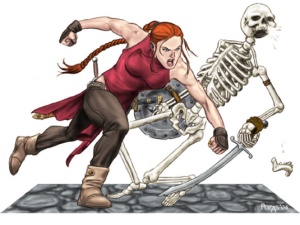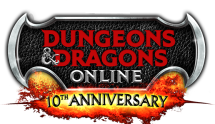I’m away from DDO during the season of Lent. This is a saved post I’ve compiled while I’m away. This post may or may not contain sensitive subject matter unsuitable for some minds (specifically, religion).
Reader discretion advised.
~~~
We all know of many veteran DDO players that have completed mighty deeds. They’ve beaten almost everything in the game, and on the highest difficulties or with some clever tricks.
But once you’ve made yourself the best killing machine you can be in DDO and have conquered all, what else is there?
Maybe a week of being away from DDO is making me stir-crazy, but I don’t think so.
Going Deeper
Games are escapism, yes. But what if it becomes too real to your mind?
We know of the story in The Matrix, a near-perfect virtual reality of the world, built to placate humanity. But, as the story unfolds, we learn that the Matrix works like any advanced operating system. You can’t leave it up forever before errors accrue and the system must be restarted. And the stabilizing element of the Matrix, the ability to choice, ultimately causes the system’s slow degradation. An Anomaly appears, who becomes Choice Incarnate, that destabilizes the system even more. That’s Neo. And he wasn’t the only One, as the story goes.
For those who choose reality, you may wake up and challenge the unreality.
A similar notion is found in the film Inception, where some people go to sleep for hours because they accept the dream as their permanent reality now. In that story, some go to sleep to wake up.)
But the dreamers in Inception can’t take anything back from their experience. And the escapees from The Matrix are fighting a cyclical battle they have been fated to lose, definitively, five times before. And only One man knows the secret and can break the cycle. Else, mankind is locked in a continuous state of imprisonment. The people of Zion don’t realize that the Machines has always kept them under a form of control and have destroyed them each time the Matrix had to be restarted.
For many that escaped, the real world is so frightening that they regret leaving that virtual cage, that virtual life. They felt they could accomplish or feel more safe — or at least seem to feel more accomplished and safe — in the Matrix than in the real world.
The Search for…Something
I connected this notion to the easily found complaints on the DDO forums about the quality of the game.
- When is there going to be an “end-game” battle?
- I should be able to solo any raid.
- This game is too easy.
- Why are they nerfing (insert item here)
- It’s time to (insert appallingly tough suggestion/monster/quest here)
Now, I’m neither the worse nor best player in the game. But I question about the ultimate motivations of some players. I’ve toyed with these motivation before with a player character type test.
If you are trying to attain “ultimate power” in a game, being able to crush any challenge you find (by yourself or with compatriots), then what is left for you to do?
These players are asking for their world to expand with them. But is this a natural way to think about life?
Game worlds aren’t true worlds. Even if you had the combined intellects of Einstein, Leonardo, Hawking, Sun-Tzu, Eisenhower and Alexander the Great in a perfect fighter amalgamation of Hercules, Legolas and Aragorn, Luke Skywalker and Steven Strange, combined with the wealth and equipment of Bruce Wayne, Tony Stark, Bill Gates, Warren Buffet and Reed Richards, you could not possibly find and beat every challenge that the real world can present to you.
The real world is an infinite battle because it continually evolves, whether you want it or not, or whether you’re ready for it to do so.
A game world has a start and an end. There is repetition and respawning and reincarnation to simulate a cycle of life. But life in DDO, WoW and every other MMO can only present a static bubble of a world in need. A game, by definition, is a form of simulation. Ultimately, you can predict its behavior, and anticipate most events. An experienced gamer becomes quasi-omniscient. That’s why many players become bored, especially if they have a one-track mind in terms of playing only one tactical avenue of a MMO.
And even if a game could better simulate reality, there are plenty of new, confused and disoriented players in the game that strongly implies that games should have a limit in size. Else, the game world would be just as terrifying as trying to make your way in the real world, and would discourage you from coming back.
For this and more logical reasons of coding and server size and bandwidth, there are a finite series of challenges to a game. There are difficulties to turn up the challenge level of these quests and raids, but it is quite possible to beat every single one of them. Doing that gains you a +6 tome of your choice. Sir Geoff of Hanna and Gamer Girl pulled this off recently.
But…after you vanquish everything and at the highest level of play, what is there left to do?
Maybe a better question for the Gamer That Beats Everything is “What are you searching for?”
Meditation
I’m not going to be so arrogant as to presume that I know the psychology of these people who ask for more from DDO on the forums. So, I’m not going to try to answer what these players are truly seeking as they play.
But I can ask myself this question.
During this time away from the game during the season of Lent, I’m asking myself why I played DDO in the first place. Is this the only place where I feel like I “accomplish” something, especially if my work or home chores don’t yield a real, genuine accomplishment that I get paid actual money for completing?
Have I become some kind of attention-whore with this blog and compiling the guides?
As I said, it’s important to know the real world from the game world, and not to put too much energy into the unreal if it doesn’t benefit the Real.
I know one reason why I play, and it leaves a little chill in me when I contemplate it.
The real world is scary. The real world is harder than any adventure any game can dream. The game worlds are safer. Yet I have the power to avoid things I don’t want to encounter while inside that world.
But while the game worlds provide a little adrenaline and satisfaction in puzzle solving or strategy, it’s still ultimately unsatisfying because game worlds cannot come close to reaching the level of complexity and difficulty that the labors of the real world throw at us everyday. I don’t have to worry about mundane things such as eating, or sleeping, or shelter, or taxes.
But then, the game world doesn’t leave you with soul-crushing events that can persist until you die and/or are penniless.
The game world, if used improperly, can be a temptation that makes you try to avoid the “game” of the real world. Temptations rarely lead us to fortunate results.
Nietzsche said “That which does not kill us makes us stronger.” Is that really true in the game world? Generally, yes. Dying requires you to examine your strategy and gear, and to adjust them to fight and win the next time. But the real world often doesn’t provide a second chance. It’s a true “permadeath” challenge. No wiki. No “developer” or “game master” to call up when you’re stuck.
(Or is there a Game Master? For me, yes, there is. But like Turbine’s GMs, I don’t always get a direct answer with Him, and what answers I might here back may be quite cryptic.)
If you win at objectives in the real world, satisfaction is certainly more fulfilling, I think. It’s the difficulty levels we often can’t handle. There’s some training you might get in the quest “Changing the Diaper of Despair” if you had younger siblings or cousins. And there are guides to buy for many of life’s challenges, and some may get you by.
But who wants to get into an Epic Elite version of “Divorce Dungeon”? How can you train for that? I did that once. I barely came out of it with much of anything. Certainly didn’t feel victorious. French-kissing a kobold would’ve been more pleasurable than that experience.
Gamers place themselves in a strange existence. Game worlds may be ultimately too easy, while the challenges of the real world are ultimately too hard. And game worlds can provide an unhealthy realm of escapism. Human weakness tends to pick the path of least resistance.
Do we choose to live in the Matrix? Do we choose to go deeper in the dream? Do we prefer the worlds of the simulacrum? And at what expense?
While I believe in the Resurrection of the Body and an after-life, as a living person today, this belief sometimes presents only a hollow and terrifying consolation. That’s a natural, human reaction. We are conditioned to seek a foundation, an assurance, a result whereby our reason can feel pleased. I simultaneously reject the reality of the unreal, the simulacra, while trying to enjoy the panacea while inside it.
In the case of the after-life, I think I’m only freaked out because I think I’ve not studied my “class” game manuals sufficiently or listened to enough advice from veteran players in the Game of Life.
The real world does have similar broad objectives that parallel game themes.
- Enter the world.
- Learn how the world works.
- Help others as you would like to be helped.
- Don’t let fear stop you from doing what you can.
- Die well with a list of things accomplished.
But the real world adds one objective that the game world won’t do.
- Don’t expect to take any accomplishments or worth with you as you go to the next world, or even think that your efforts gained you “points” in the next life.
I think this Lenten season, of being away from the game worlds and playing the game of Reality alone, is training me more horrifying well than I imagined.
There is a spoon, in reality. We only fake not having a spoon as gamers. You haven’t chosen the red pill, as Neo did. You’re choosing to stay in the virtual world, where all you accomplish disappears when the last servers are powered down, someday.
We’re far from superhuman in the real world. Yet we have to face every encounter with ratty gear (if we’re lucky), limited skill, expensive alternatives, limited praise, staggering odds, and sometimes only one shot at success.
I submit that my Diety gives me power and strength as I level up. But anyone with faith can tell you that you’re often given skills and gifts for which you can’t immediately identify, much less have any idea how to wield.
I choose Lent to force me to take the red pill.



Mar 05, 2015 @ 09:26:10
Reblogged this on DDOCentral.
Mar 06, 2015 @ 07:53:11
I want to do more than just “Like” this post but I have no time. Very well-written and thought provoking.